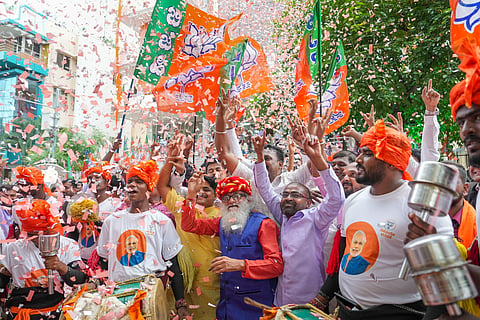

The failure of the BJP to secure a majority may throw fresh challenges once Prime Minister Narendra Modi begins his third term at the helm even if the NDA alliance stays together. On Tuesday, the most crucial setback to the ruling party came from the heartland state of Uttar Pradesh where they ended up as the second largest party and saw many heavyweights including Smriti Irani defeated.
An overall picture of the Lok Sabha election verdict shows that the INDIA front's campaign was surprisingly successful, despite the fact that they could not fulfill their aim of forming a government. The end result means that BJP has been cut down to size and will now have to follow the coalition dharma, having to deal with the pulls and pressures that could follow.
Playing a part in the result was south of India that saw the BJP win fewer seats than they did in the 2019 Lok Sabha elections, when they had won 29 seats on their own. This time, despite winning three seats in Andhra Pradesh (against no seats in 2019), they could only win 29 seats in the region again.
Ally Chandrababu Naidu of the TDP roared back to power in the Andhra and also won 16 vital seats. The 19 seats that the state gave to the NDA was a lifeline and helped secure a majority for the alliance.
The rival Yuvajana Sramika Rythu Congress Party (YSRCP) led by YS Jagan Mohan Reddy faced an anti-incumbency wave and lost the elections as it failed to address unemployment, farmers' issues, welfare schemes, etc. Chandrababu Naidu is now set to play a crucial role at the Centre in the days ahead and could even dictate terms. What a turnaround for a man who was in jail just a little over seven months ago!
Karnataka was the only southern state that had conformed to the national trend in 2019. But in this election, the ruling Congress challenged this and clinched nine seats out of the 28 Lok Sabha seats there.
In the 2019 election, the Congress had won only one seat against the BJP's 25 seats. Net, net it was a gain for the grand old party, but they had expected a bigger haul after their sweeping win in the assembly elections and the implementation of the five guarantees by Chief Minister Siddaramaiah.
In Telangana, the fall of the Bharatiya Rashtra Samiti benefitted both the Congress and the BJP, who secured eight seats each. This ensured a gain for the BJP (4 seats ) and Congress (5 seats).
Tamil Nadu was the only southern state in the 2024 Lok Sabha election to return almost the same verdict it did in 2019.
Tamil Nadu's electoral landscape was marked by the dominance of the Dravida Munnetra Kazhagam (DMK) alliance, led by MK Stalin.
The alliance won all 39 seats in the 2024 election, bettering its victory margin of 38 seats in the 2019 election (one seat had been won by ex-CM O Panneerselvam's son P Ravindhranath then). The Congress party, a partner, won the only seat in Puducherry.
The rival AIADMK were inflicted a thorough drubbing and the party and its leader Edappadi K Palaniswami may face serious challenges in the days ahead.
On then to Kerala. God's own country saw the BJP opening its account in the state for the first time, a feat it has not been able to achieve despite the fact that relative to its population Kerala has more RSS shakhas than other states.
The victory of film star Suresh Gopi, the party's candidate from Thrissur, could prove to be a turning point in Kerala's electoral politics. Moreover, Rajeev Chandrasekhar, BJP's candidate from Thiruvananthapuram, lost the election by a narrow margin.
But it must be underlined that Suresh Gopi’s image as a film actor who is not a mainstream BJP politician could have been an important factor in securing his victory. In Kerala, the performance of other mainstream BJP leaders was almost as bad as it was in the past.
The United Democratic Front (UDF) almost repeated its performance in the 2019 election. This time, they secured 18 seats and lost only one seat in comparison to the election from five years ago.
The status of the ruling Left Democratic Front (LDF) remained the same as in 2019, with them winning only one seat. The anti-incumbency factor against the state government and fact that the UDF stood a better chance when it came to forming the government at the Centre seem to have influenced the voters.
The INDIA front's showing in Tamil Nadu, Kerala and Karnataka sends a strong signal that the South will continue to remain a holdout where the BJP will not able to make inroads easily. Despite Prime Minister Modi's many campaign visits and his meditation on the Vivekananda rock and despite Amit Shah's pronouncements, little is expected to change for the saffron party in this part of India when the next Lok Sabha election arrives.
KM Sajad Ibrahim is Professor, Department of Political Science & Dean, Faculty of Social Sciences, University of Kerala.